DS Automobiles DS 7 vs Hyundai Santa Fe – Performance, range & efficiency compared
Everyday use, family trips or long-distance drives – here’s where the differences show.
Discover whether DS Automobiles DS 7 or Hyundai Santa Fe fits your lifestyle better.
Costs and Efficiency:
Price and efficiency are key factors when choosing a car – and this is often where the real differences emerge.
DS Automobiles DS 7 has a noticeable advantage in terms of price – it starts at 41900 £, while the Hyundai Santa Fe costs 51200 £. That’s a price difference of around 9334 £.
Fuel consumption also shows a difference: DS Automobiles DS 7 manages with 1.30 L and is therefore noticeable more efficient than the Hyundai Santa Fe with 1.70 L. The difference is about 0.40 L per 100 km.
As for range, the DS Automobiles DS 7 performs slightly better – achieving up to 65 km, about 11 km more than the Hyundai Santa Fe.
Engine and Performance:
Power, torque and acceleration say a lot about how a car feels on the road. This is where you see which model delivers more driving dynamics.
When it comes to engine power, the DS Automobiles DS 7 has a noticeable edge – offering 360 HP compared to 253 HP. That’s roughly 107 HP more horsepower.
In acceleration from 0 to 100 km/h, the DS Automobiles DS 7 is decisively quicker – completing the sprint in 5.70 s, while the Hyundai Santa Fe takes 9 s. That’s about 3.30 s faster.
In terms of top speed, the DS Automobiles DS 7 performs somewhat better – reaching 235 km/h, while the Hyundai Santa Fe tops out at 196 km/h. The difference is around 39 km/h.
There’s also a difference in torque: DS Automobiles DS 7 pulls clearly perceptible stronger with 520 Nm compared to 380 Nm. That’s about 140 Nm difference.
Space and Everyday Use:
Beyond pure performance, interior space and usability matter most in daily life. This is where you see which car is more practical and versatile.
Seats: Hyundai Santa Fe offers clearly perceptible more seating capacity – 7 vs 5.
In curb weight, DS Automobiles DS 7 is somewhat lighter – 1651 kg compared to 1920 kg. The difference is around 269 kg.
In terms of boot space, the Hyundai Santa Fe offers noticeable more room – 711 L compared to 555 L. That’s a difference of about 156 L.
In maximum load capacity, the Hyundai Santa Fe performs to a small extent better – up to 2032 L, which is about 282 L more than the DS Automobiles DS 7.
When it comes to payload, Hyundai Santa Fe clearly perceptible takes the win – 665 kg compared to 424 kg. That’s a difference of about 241 kg.
Who wins the race?
The DS Automobiles DS 7 proves to be leaves the rival little chance and therefore becomes our DriveDuel Champion!
DS Automobiles DS 7 is the better all-rounder in this comparison.
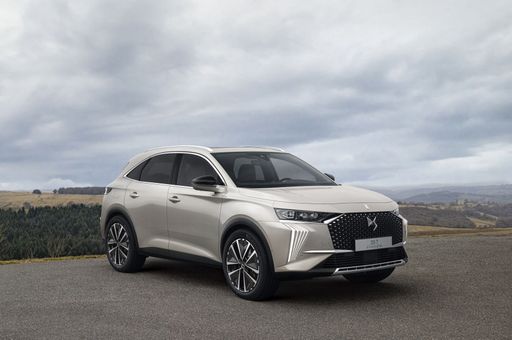 @ media.stellantis.com
@ media.stellantis.com
DS Automobiles DS 7
DS Automobiles DS 7
The DS 7 stands out with its striking design and luxurious comfort, making it a true embodiment of French elegance in the SUV segment. Inside, the cabin showcases a blend of high-quality materials and innovative features that cater to both driver and passenger needs. With its impressive road presence and refined driving dynamics, the DS 7 promises a captivating driving experience that doesn't compromise on style.
details @ media.stellantis.com
@ media.stellantis.com
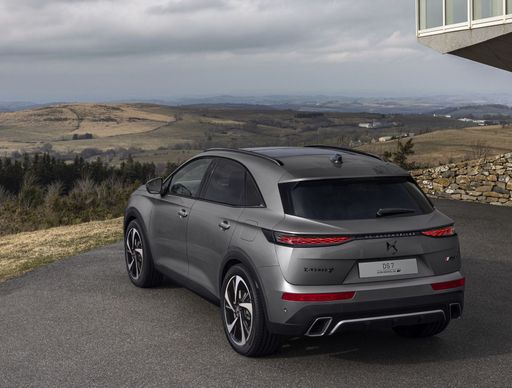 @ media.stellantis.com
@ media.stellantis.com
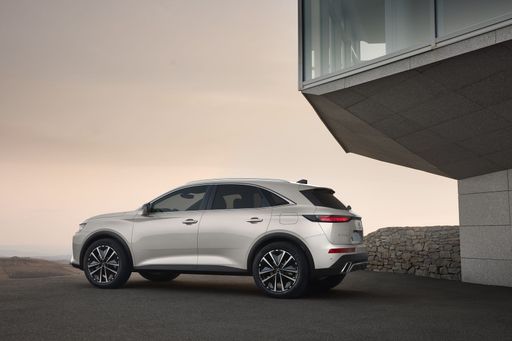 @ media.stellantis.com
@ media.stellantis.com
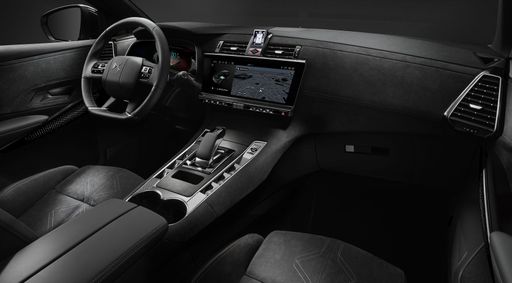 @ media.stellantis.com
@ media.stellantis.com
Hyundai Santa Fe
The Hyundai Santa Fe offers a refined blend of style and functionality, making it a strong contender in the SUV market. Its modern interior, combined with advanced technology and comfort features, creates an inviting and practical driving environment. With its sleek design and robust performance, the Santa Fe is well-suited for both urban commutes and family adventures.
details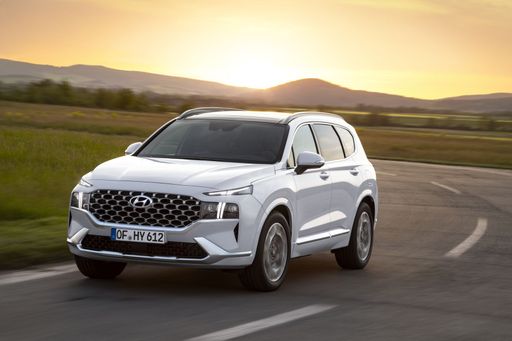 @ hyundai.news
@ hyundai.news
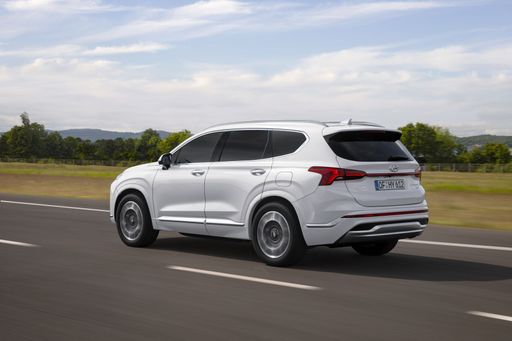 @ hyundai.news
@ hyundai.news
 @ hyundai.news
@ hyundai.news
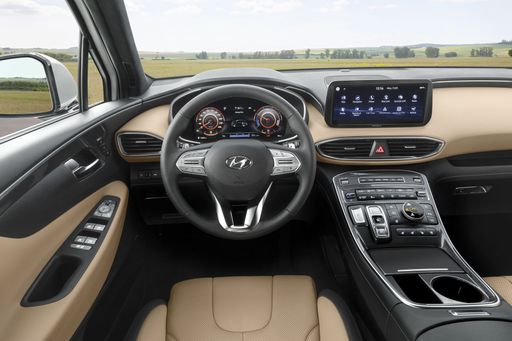 @ hyundai.news
@ hyundai.news
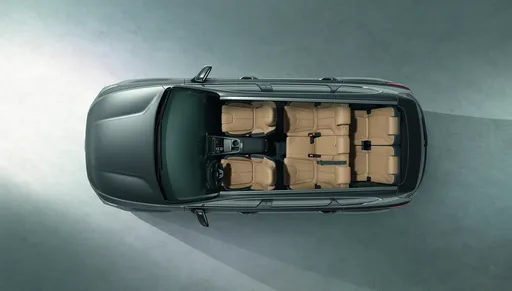 @ hyundai.news
@ hyundai.news
 @ media.stellantis.com
@ media.stellantis.com
|
 @ hyundai.news
@ hyundai.news
|
|
|
|
Costs and Consumption |
|
|---|---|
|
Price
41900 - 59300 £
|
Price
51200 - 58400 £
|
|
Consumption L/100km
1.3 - 5.5 L
|
Consumption L/100km
1.7 - 7.1 L
|
|
Consumption kWh/100km
-
|
Consumption kWh/100km
-
|
|
Electric Range
50 - 65 km
|
Electric Range
54 km
|
|
Battery Capacity
12.90 kWh
|
Battery Capacity
-
|
|
co2
30 - 145 g/km
|
co2
38 - 160 g/km
|
|
Fuel tank capacity
43 - 55 L
|
Fuel tank capacity
47 - 67 L
|
Dimensions and Body |
|
|---|---|
|
Body Type
SUV
|
Body Type
SUV
|
|
Seats
5
|
Seats
5 - 7
|
|
Doors
5
|
Doors
5
|
|
Curb weight
1651 - 2002 kg
|
Curb weight
1920 - 2165 kg
|
|
Trunk capacity
555 L
|
Trunk capacity
621 - 711 L
|
|
Length
4593 mm
|
Length
4830 mm
|
|
Width
1891 mm
|
Width
1900 mm
|
|
Height
1625 mm
|
Height
1720 mm
|
|
Max trunk capacity
1750 L
|
Max trunk capacity
1942 - 2032 L
|
|
Payload
398 - 424 kg
|
Payload
560 - 665 kg
|
Engine and Performance |
|
|---|---|
|
Engine Type
Diesel, Plugin Hybrid
|
Engine Type
Plugin Hybrid, Full Hybrid
|
|
Transmission
Automatic
|
Transmission
Automatic
|
|
Transmission Detail
Automatic Gearbox
|
Transmission Detail
Automatic Gearbox
|
|
Drive Type
Front-Wheel Drive, All-Wheel Drive
|
Drive Type
All-Wheel Drive, Front-Wheel Drive
|
|
Power HP
130 - 360 HP
|
Power HP
239 - 253 HP
|
|
Acceleration 0-100km/h
5.7 - 11.9 s
|
Acceleration 0-100km/h
9 - 9.3 s
|
|
Max Speed
195 - 235 km/h
|
Max Speed
180 - 196 km/h
|
|
Torque
300 - 520 Nm
|
Torque
367 - 380 Nm
|
|
Number of Cylinders
4
|
Number of Cylinders
4
|
|
Power kW
96 - 265 kW
|
Power kW
176 - 186 kW
|
|
Engine capacity
1499 - 1598 cm3
|
Engine capacity
1598 cm3
|
General |
|
|---|---|
|
Model Year
2024 - 2025
|
Model Year
2024 - 2025
|
|
CO2 Efficiency Class
E, B
|
CO2 Efficiency Class
B, E, F
|
|
Brand
DS Automobiles
|
Brand
Hyundai
|
What drive types are available for the DS Automobiles DS 7?
The DS Automobiles DS 7 is available as Front-Wheel Drive or All-Wheel Drive.
The prices and data displayed are estimates based on German list prices and may vary by country. This information is not legally binding.
